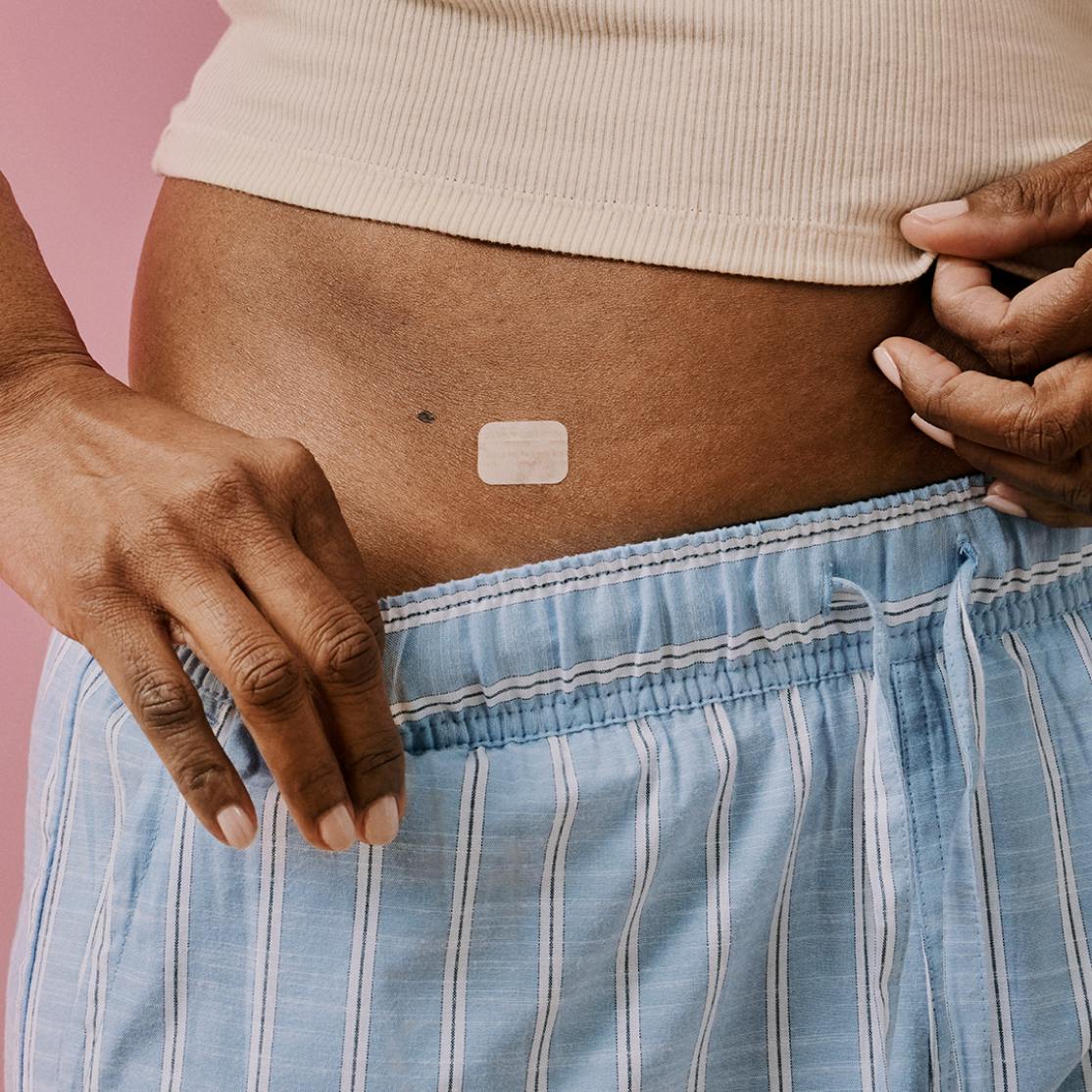- Menopause affects women in a wide variety of ways—some of us have many symptoms, some have very few. The vast majority of women will experience some problematic symptoms, especially hot flashes and night sweats, brain fog and trouble sleeping.
- Physical changes during menopause, including weight gain and bone loss, are two of the most pressing concerns for many women.
- There are a variety of treatment options for managing symptoms and staying healthy. Work with a menopause-informed clinician who can create a customized plan for you.
It’s not an overstatement to say that the menopausal transition may be one of the most pivotal periods of a woman’s life. Your body is going through immense hormonal changes as it winds down its reproductive years. And, wow, do those changes make themselves known.
Wonky periods (before they disappear altogether), hot flashes, insomnia, depression and anxiety, irritability and rage, painful sex and low desire—all can all come together gradually or suddenly, and make you feel utterly unlike your usual self. Add in other elements of this life stage, from family responsibilities, to relationships and career demands, and you have a recipe for, well, a new you.
All that said, menopause can be a time where you thrive—truly! And it starts with an understanding of menopause, when it (usually) begins, the symptoms you might expect, and how you can take control of your health. These are your need-to-know menopause stats, gathered in one place to learn from and share.

Top Menopause Statistics
Having a hot flash? You’re not alone.
Six thousand—6,000!—women officially hit menopause each day in the United States (defined as exactly one year from your final period), which means that 1.3 million women enter this important stage of midlife each year.
About four in five midlife women experience problematic symptoms of menopause like hot flashes and night sweats, sexual problems, sleep disturbance, and brain fog, all of which have been shown to affect a woman’s quality of life, relationships, career, and overall health.
This entire stage of life is often called menopause, but really there are three distinct parts–and, when it comes to statistics–each with their own numbers that define them:
- Perimenopause is the phase leading up to menopause. It’s the time when the hormones estrogen and progesterone begin their descent, but wildly fluctuate along the way. Those fluctuations trigger the symptoms associated with menopause like hot flashes, mood swings, and irregular periods. Perimenopause typically starts in your mid-40s. This stage is four years, on average, but it can last up to 10 years for some women.
- Menopause is actually a single moment in a woman’s life when you’ve gone 12 consecutive months without a period. On average, a woman is 51 years old when she hits menopause. This marks the end of your reproductive years.
- Postmenopause is the rest of your life. Symptoms may persist well into this phase, including hot flashes, which affect 56% of women, and vaginal dryness, which affects 45% of women in postmenopause.
Unfortunately, most women approach menopause underprepared–94% say they received no education about it in school.
Just 49% of women in perimenopause have spoken to a health professional about menopause, with only 58% of women in postmenopause bringing it up with their doctors.
About half of women wait six months with life-disrupting menopause symptoms before seeking care from a health professional.
One of the issues women run up against in getting the right care for menopause is the lack of training among providers–80% of OB/GYNs are untrained in menopause. (Luckily you have great resources at your fingertips–more on this, below.)
Menopausal Symptoms
Oh, let us count the ways the menopausal transition can shift how you think, act, and feel. Menopause affects every woman differently, and the symptoms can change throughout this stage of life. So it’s helpful to have the whole range of symptoms to have on your radar, starting with some of the more common of the bunch:
- Irregular periods: Periods can become shorter, longer, heavier, lighter, spotty, or some months may be skipped entirely. After not having a period for 12 consecutive months, you have officially crossed the threshold of menopause.
- Hot flashes: The single most common symptom of menopause, hot flashes affect 75% of women. These sudden temperature swings can have an impact on every facet of life, with about half of women reporting that hot flashes affect their work, social life, leisure time, sexual activity, and energy levels. That’s no wonder, since 1 out of 10 women say they have more than seven hot flashes per day.
- Night sweats: Night sweats are hot flashes that happen at night, and they also affect 75% of women.
- Sleep problems: Talk about waking up in a sweat. Did you know that night sweats bump up the likelihood that you’ll wake up in the middle of the night by 85 percent? In addition, night sweats also have the capacity to tank the quality of your sleep, as well as your sense of well-being and functioning during the next day.
- Mood changes: When your hormones are on a rollercoaster, your emotions go along for the ride. Think back to puberty, PMSing, or pregnancy and know that the menopausal stage is no different. About one in two women report midlife irritability and mood swings, according to a global study appearing in BMC Public Health.
- Sexual problems: If your life between the sheets isn’t what it once was, know you’re far from alone. Hormonal changes affect your libido and contribute to vaginal dryness (which can cause pain with intercourse, driving down desire even further). Overall, Midi has found that about 77% of postmenopausal women report low sex drive.
- Brain fog: Whether it’s trouble concentrating or a hard time absorbing information, women in their 40s and 50s commonly report a cognitive slow-down. Memory problems and forgetfulness affect 82% of women, according to a survey of 12,507 women, with peak problems at age 50 to 54. It’s not just hormonal changes that are to blame; lack of sleep and hot flashes and night sweats are associated with more of brain fog. The good news is that treatment can help, and cognitive sharpness starts to return after age 55.
What Success Looks and Feels Like
Physical Changes During Menopause
If the person looking back at you in the mirror these days is a little less recognizable, it’s because your body goes through changes during the menopausal transition. These are normal, due to hormonal and lifestyle factors, but many women find them upsetting, for good reason. Here’s what you may notice, as well as some shifts you can’t see, but should understand:

- Weight gain: Post menopause, it’s common for women to gain 1.5 pounds per year. In fact, 87% of Midi patients say they have issues with weight gain and body composition changes during this time. Fat may be redistributed into your abdominal area, which poses additional health risks in terms of increasing your odds of heart disease. In addition to eating and exercising for your body’s changing needs, some women find benefit in taking medications that help reduce appetite like GLP-1s.
- Skin changes: If you thought that you left your days of acne behind, think again—one out of four women battle breakouts in their 40s, while about one in six women have pimples into their 50s. In addition, with less estrogen, skin can also become drier, thinner, and you may notice more wrinkles and sagging. There are numerous solutions for this, including topical over-the-counter and prescription products, in-office procedures, and healthy lifestyle habits.
Mental Health and Menopause
Estrogen plays a key role in keeping your mood stable, so when it fluctuates and declines, women can experience emotional turbulence. Added to hormonal factors, there are many other classic midlife pressures that can throw mental health off kilter. Think intense work schedules, caretaking for kids and aging parents, possible relationship problems, and [insert your particular challenge here]. Top all that off with the physical symptoms of menopause, and it’s no wonder that perimenopausal women were found to have a 40% higher risk for symptoms of depression or a diagnosis of depression compared to premenopausal women.
Stress management, incorporating activities you enjoy into your day, therapy and medication, exercise and other mood-management strategies can each help immensely during this time.
Treatment Options for Menopause Symptoms
Now that you’re primed on common menopause symptoms, the next question is how can you effectively manage the hot flashes, night sweats, mood changes, lack of libido, and more? The right combination of treatments can be different for every woman, and working with your clinician will help uncover the right-for-you formula. Just know that you have many effective options.
- Hormonal medications: Prescriptions like hormone replacement therapy (HRT) or contraceptives may be recommended depending on factors like your personal health history, age, and goals. HRT is available in a variety of forms, including pills, patches, vaginal rings, and gels. Although it’s not right for every woman, HRT has been found to be safe and effective for women to treat hot flashes/night sweats when started before age 60, finds a recent review in JAMA authored by a group of leading medical experts. This treatment can help women feel better within weeks, and sometimes days.
- Non-hormonal prescriptions: Depending on your symptoms, certain FDA-approved medications that don’t contain hormones may be prescribed to you. For example, SSRIs may be recommended to treat depression and hot flashes and GLP-1 medications may be prescribed to address midlife weight gain
- Supplements and botanicals: Many patients, including those who have a personal or family history of breast cancer, benefit from the addition of supplements and/or botanicals in their routine. In fact, about 70% of women used herbal remedies to manage symptoms like hot flashes, according to one study. When it comes to supplements, it’s important to follow the advice of a clinician who is knowledgeable in menopause treatments rooted in science. There are a number that your clinician can recommend for you, but black cohosh, ashwagandha, soy, red clover, or valerian are among those that are well-researched.
- Lifestyle and wellness support: Lifestyle changes can make a huge impact on your menopause symptoms, but they can be tough to implement on your own. Midi patients receive guidance on diet, exercise, stress management, social support, and sleep, plus recommendations for outside integrative or mental health therapies as needed.
Menopause and Aging
Menopause can have a huge impact on women’s health at midlife. These are some of the health risks to keep in mind:
- For your heart: Estrogen is heart-protective, and after menopause, the risk of cardiovascular disease jumps as estrogen declines. In fact, heart disease is the number one cause of death for women.
- For your brain: Age at menopause matters. Women going through premature menopause (before age 40) and early menopause (between ages 41 and 45) had a 20 to 36% higher risk of dementia, respectively, compared to women going through menopause at typical ages.
- For your weight: 43% of menopausal women have obesity. That’s due to many factors, including a shifting body composition (storing more belly fat), activity levels and diet, as well as the challenges of managing menopausal symptoms that make it harder to maintain a healthy weight.
- For your bone health: One in five women over age 60 have osteoporosis, while one in two have low bone mass (osteopenia), both of which increase risk of fractures.
Public Health Challenges Related to Menopause
Despite the fact that perimenopause can begin for women in their 40s, women are often unprepared for the changes that occur in the transition. In a survey of women under 40, 80% said they had no or “just some” knowledge of this stage of life.
In addition, other surveys have found that just 18% of women were accepting of menopause (meaning they weren’t going to look for solutions and help)—with the majority searching for info on the transition as their symptoms started.
The lack of education and conversation makes an impact at work, as well. Just 31% of women said they feel comfortable talking about menopause at work, with one in six supervisors saying they’re “uncomfortable” making accommodations for menopause symptoms, according to recent data from the Society for Women’s Health Research.
Given this lack of support, it’s not surprising that women who have the most severe menopause symptoms are 15.6 times more likely to have problems at work—missed days, reduced hours, being laid off or fired, or a job change related to symptoms—compared to those with more mild changes. That equates to a loss of $1.8 billion in the U.S. alone, according to research in Mayo Clinic Proceedings.

At Midi, we recognize the importance of understanding menopause, preparing for the shifts ahead, and developing a customized-to-you treatment plan. Open conversations, starting with sharing the facts, help get women on the road to relief.
With the right care, no one needs to dread menopause or midlife. This can be a stage full of personal growth, new wisdom, and welcome change.
Frequently Asked Questions
What are the statistics for menopause?
There are so many menopause statistics we could rattle off! Importantly, about 6,000 women in the U.S. reach menopause every day. Most women experience some symptoms of menopause, including hot flashes, which affects 75% of women during this stage of life.
What is the most common age for menopause?
Menopause is defined as the day when a woman has gone 12 months without a period. On average, women hit menopause at age 51. However, perimenopause, the phase leading up to menopause, typically starts in the mid-40s, though it can be earlier or later for some women.
What lifestyle factors affect menopause?
Cigarette smoking is by far the most significant lifestyle factor that affects age at menopause, with current or former smoking linked to a higher risk of early menopause (defined as menopause before age 45).
Lifestyle factors that can improve the symptoms of menopause include eating a healthy diet, fitting in regular physical activity, getting quality sleep, managing stress, and limiting alcohol.
Is it better to go through menopause naturally?
There is no wrong or right way to go through menopause, but we can all agree that it makes no sense to suffer needlessly from symptoms that harm your quality of life. The right menopause treatment will depend on a woman’s health history and align with her goals, and that can look different for everyone. Many women benefit from HRT, as well there as supplements, lifestyle changes, and other treatments. Working with a clinician trained in menopause can help you put together the right plan tailored for you.
What happens to a woman during menopause?
Menopause is a stage that every woman goes through. During perimenopause (the stage that precedes menopause, when periods completely stop) our bodies begin to produce less of the hormones estrogen and progesterone.The decline isn’t regular and smooth, however. Think instead of a rollercoaster with spikes and dips along the way, which can trigger symptoms like hot flashes and mood swings. Menopause is officially defined as the day when a woman has gone 12 months without a period, but symptoms may persist long after that milestone is reached.
The menopausal transition is a life-changing time in a woman’s life. And while 80% of women experience very real symptoms of menopause to contend with, these are not problems that you are simply stuck with. There is help.
Following an individualized treatment plan helps more than 90% of Midi patients feel symptom relief within two months.
If you’re in perimenopause or menopause and want guidance from clinicians who specialize in women’s midlife health, book a virtual visit with Midi today.
Hormonal change is at the root of dozens of symptoms women experience in the years before and after their period stops.
Our trained menopause specialists can help you connect the dots to guide you towards safe, effective solutions.
Whether you need personalized guidance or a prescription routine to tackle symptoms—including brain fog, hot flashes, sleep trouble, mood swings, and weight gain—we’ve got you covered. Learn more here.
Midi’s mission is to revolutionize healthcare for women at midlife, wherever they live and whatever their health story. We believe that starts with education, to help all of us understand our always-changing bodies and health needs. Our core values guide everything we do, including standards that ensure the quality and trustworthiness of our content and editorial processes. We’re committed to providing information that is up-to-date, accurate, and relies on evidence-based research and peer-reviewed journals. For more details on our editorial process, see here.







